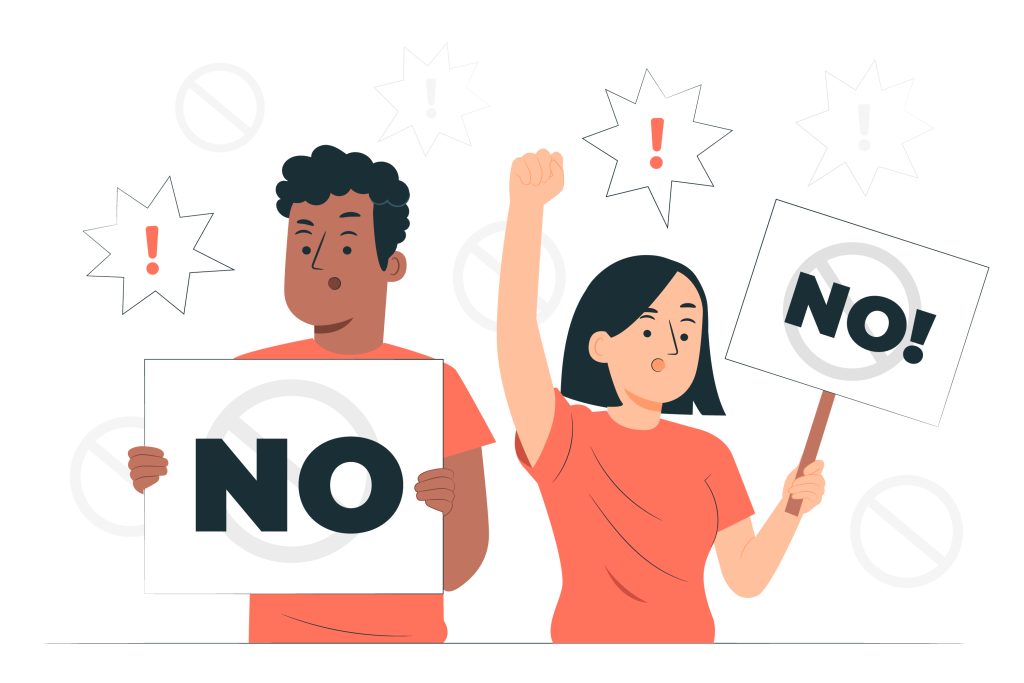In today’s fast-paced world, productivity and success are often tied to achieving ambitious goals. Whether it’s climbing the career ladder, hitting fitness milestones, or pursuing personal development, the common narrative is that setting clear, measurable goals is the key to progress. However, there’s an emerging shift in the way people approach personal and professional growth: boundaries are more powerful than goals.
The concept of boundaries is not new, but its relevance in the current era of hustle culture, burnout, and mental health awareness is gaining unprecedented attention. Boundaries—whether personal, emotional, or professional—serve as protective measures that maintain a healthy balance between our commitments and self-care. In this article, we’ll explore why boundaries are more powerful than goals, becoming the cornerstone of sustainable success, work-life balance, and mental well-being.

Why Boundaries Are More Powerful Than Goals
Boundaries are defined as the limits we set for ourselves regarding how we interact with others and our environment. While goals are focused on achieving specific outcomes, boundaries are about protecting our time, energy, and emotional well-being. But why are they gaining more traction than traditional goal-setting methods? Here’s why:
1. Combatting Burnout and Overwork
The modern work culture often glorifies the concept of the hustle—the idea that the more you work, the more successful you’ll be. However, this often leads to burnout, fatigue, and a lack of fulfillment. The relentless pursuit of goals, particularly in high-pressure environments, can strip away time for personal care, relationships, and recreation.
Setting boundaries is a more sustainable approach to success. Instead of focusing on the next milestone, boundaries protect the necessary breaks and downtime that ensure long-term productivity and mental health. Studies have shown that work-life balance, achieved through healthy boundaries, contributes to greater job satisfaction and overall well-being.
2. Fostering Emotional Resilience
Boundaries are essential for emotional health. They allow individuals to say “no” when necessary, without guilt or fear of disappointing others. In a world where emotional labor is often invisible, setting clear boundaries helps individuals prioritize their own needs without compromising their emotional integrity.
For instance, setting boundaries in personal relationships—such as choosing not to engage in toxic conversations or withdrawing from stressful social obligations—leads to stronger emotional resilience. Research indicates that people who can set and maintain boundaries tend to have lower levels of stress and anxiety.
3. Creating Space for Flexibility and Adaptability
Goals, by their nature, can often feel rigid. They focus on a specific target, and when that target is not met, it can lead to feelings of failure. However, boundaries are flexible. They create a framework within which individuals can work toward various objectives, yet allow space for growth, learning, and unexpected opportunities.
In fast-changing environments, flexibility is crucial. With clear boundaries, people can adapt without losing sight of their priorities. This adaptability can make all the difference in maintaining a sense of control and progress, especially when faced with unforeseen challenges or life changes.
How Boundaries Are More Powerful Than Goals in Real-Life Applications
1. Professional Settings
In the workplace, setting boundaries can be a game-changer. High performers often set clear boundaries to protect their time, ensuring they remain focused and avoid distractions. Rather than constantly chasing promotions or additional responsibilities (goal-driven behavior), employees with strong boundaries prioritize work that aligns with their values and long-term career satisfaction.
- Work Hours: Clearly defined work hours help prevent overwork and burnout.
- Task Prioritization: Setting boundaries around the types of tasks you’re willing to take on ensures that you’re not overcommitting.
- Emotional Boundaries: Learning to protect yourself from emotional labor—whether it’s managing a difficult boss or colleagues—is essential to maintaining a healthy work-life balance.
By focusing on boundaries, professionals can establish a more sustainable pace, avoiding the mental toll that often comes with working toward aggressive goals at all costs.
2. Personal Development and Well-being
When it comes to personal growth, goals can sometimes feel like an overwhelming to-do list that never ends. The pressure to constantly improve or reach new milestones—be it in fitness, learning, or self-development—can create stress and frustration. Setting boundaries, however, provides space for personal development to happen naturally, without the undue pressure.
- Physical Boundaries: Prioritizing rest, sleep, and recovery to maintain physical health rather than solely focusing on achieving fitness goals.
- Mental Boundaries: Limiting exposure to negative news, toxic people, or situations that drain emotional energy.
- Social Boundaries: Protecting time for oneself by setting limits on social engagements and focusing on meaningful relationships.
These boundaries promote a balanced, self-compassionate approach to personal development, leading to sustainable growth.
3. Relationships and Social Life
In relationships, whether with friends, family, or romantic partners, boundaries are just as important as goals. Healthy boundaries in relationships foster trust, respect, and mutual understanding, while the lack of them can lead to resentment and conflict.
- Time Boundaries: Setting limits on how much time you spend with others ensures you can maintain personal time for self-care or other activities.
- Emotional Boundaries: Knowing when to step back from emotionally draining conversations or situations preserves emotional well-being.
By focusing on boundaries instead of constantly striving to “meet expectations” in relationships, individuals can enjoy more fulfilling, authentic connections.
Tips for Setting Healthy Boundaries
While it may sound simple, setting and maintaining boundaries can be challenging, especially when external pressures or internal guilt come into play. However, with practice, boundaries can be integrated into daily life. Here are some tips for setting healthy boundaries:
- Know Your Limits: Reflect on your physical, emotional, and mental limits. What drains you? What recharges you? Identifying your limits helps you establish where boundaries are needed.
- Communicate Clearly: Be direct but respectful in communicating your boundaries to others. Whether at work, in relationships, or in your personal life, clear communication helps others understand your limits.
- Respect Others’ Boundaries: Boundaries are a two-way street. Just as you set your own, respect the boundaries of others to foster mutual respect and understanding.
- Learn to Say No: Saying “no” is one of the most powerful tools in maintaining boundaries. It allows you to prioritize your well-being over external demands.
- Self-Reflection: Regularly assess whether your boundaries are being respected and whether they still serve your needs. Boundaries evolve as life circumstances change.
Conclusion: Embracing Boundaries for Sustainable Success
The growing focus on boundaries are more powerful than goals marks a significant shift in how we approach personal and professional success. Boundaries are not just protective measures—they are powerful tools that allow us to create balance, preserve mental and emotional well-being, and pursue sustainable growth.
By focusing on boundaries, we create room for meaningful progress without the stress and strain that often accompanies relentless goal-chasing. Whether in the workplace, in relationships, or in personal development, setting boundaries empowers us to live in alignment with our values, fostering success that is both fulfilling and sustainable.
References:
- Kessler, K. (2023) The Importance of Boundaries in Reducing Burnout. Available at: https://www.journalworkplacehealth.com (Accessed: 27 June 2025).
- Patel, R. (2022) Emotional Resilience and Boundaries: How to Protect Your Energy. Available at: https://www.mindfulliving.com (Accessed: 27 June 2025).
- Morris, T. (2021) Boundaries and Personal Growth: The Key to Healthy Development. Available at: https://www.personaldevinsights.com (Accessed: 27 June 2025).






